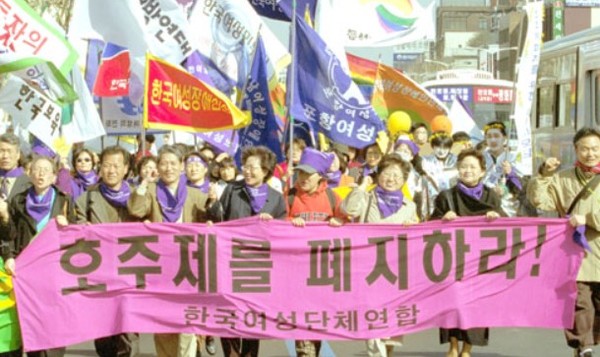
On March 2, 2005, the decision was made to abolish the household and family registration system, called Hoju-je, which had been used to indicate the status of Korean citizens. The abolition of the Hoju-je marked the successful conclusion of the family law reform movement that had been ongoing in Korea since the 1950s. Moreover, the abolition of this system holds significant importance from legal, historical, and social activism perspectives.
To understand Hoju-je, it is necessary to comprehend the terms ‘Hoju’ and ‘Hojeok.’ Hojeok refers to a document used by a country to clearly define the status of its citizens by recording information about the individuals in a household. In this context, Hoju is the criteria used by a country to record family registries, representing the legal status bestowed by the state. The Hoju is typically a male, and all information about family members is recorded centering around the male who is usually considered as ‘Hoju’. For example, in a household consisting of a couple and two children, the male would be the Hoju. Hojeok records basic information about each family member, along with any changes such as deaths or marriages that may occur after the initial registration. Due to this structure, the family registry system reinforced patriarchal customs in which the country, symbolized by the male Hoju, perpetuates the family lineage.
The Hoju-je was initially introduced during the Japanese colonial era to simplify the understanding of the demographic dynamics in Korea. Even after liberation, the South Korean government continued to use this system as a legal framework for registering population and family relations. However, the Hoju-je had numerous deficiencies in regulating and managing families. Firstly, the system prioritized the male lineage, restricting women to permanent members of their natal families. In cases where a husband passed away, the Hoju shifted to a male descendant, leaving no option for registration if there were no male heirs. Consequently, single-parent families without adult males were deemed abnormal due to the peculiar characteristics of the Hoju-je. Furthermore, unmarried women faced challenges in registering their children in the family registry. The system, rooted in patrilineal principles, led to discrepancies in the family registry for adopted or stepchildren, where their legal status did not directly align with their blood relationships. These inherent flaws in the Hoju-je resulted in unconventional family structures and posed difficulties for single mothers and unmarried women in registering their children.
The problems of the Hoju-je became more pronounced in the 1990s. During this period, an increase in diverse forms of marriage and family relations diverged from the conventional notion of a ‘normal’ family. In response, civic movements advocating for family law reform began in Korean society during the 1990s to address gender discriminatory elements in the law. Civil groups[1] demanded the abolition of the Hoju-je, citing its failure to reflect the diversity of modern family structures, its historical roots, and its reinforcement of gender-based stereotypes. Signature campaigns were initiated, and female lawmakers took the lead in pushing for legal amendments. Consequently, in 2005, the Constitutional Court acknowledged that the Hoju-je institutionalized gender stereotypes by considering men as the normal Hoju and women only as family members, discriminating against women in forming legal relationships with their children, and fostering discrimination between ‘normal’ and ‘abnormal’ families. Based on Articles 10 (Dignity and Freedom of Individuals), 11 (Equality Rights), and 36(1)[2] of the Constitution, the Constitutional Court issued an unconstitutional ruling, leading to the abolition of the Hoju-je. This decision held significant importance, as it marked the culmination of over 50 years of civic movements that aimed to change discriminatory and colonial legal institutions. Moreover, the abolition of the Hoju-je created an opportunity for changing laws to reflect the various forms of emerging families, such as discussing the Act on Registered Life Partnership in these days. It also contributed to the advancement of women's rights and the realization of a more gender-equal society.
Through the sustained efforts of citizens over the past 50 years, Korean society has evolved to embrace more diverse family structures and eliminate discriminatory practices. Presently, various forms of families are legally recorded and managed under the Act on Registration of Family Relations, replacing the outdated Hoju-je. The current legal act allows for the administration of families in a manner that reflects the diverse nature of contemporary society. The moments where shortcomings in the law were pointed out and actively addressed by citizens will be remembered as significant milestones in the history of Korea.
[1] For arguing the abolition of Hoju-je, Citizen’s Gathering for Abolition of Hoju-je was established. Many civic groups, Korea Legal Aid Center for Family Relations, Korea Women’s Associations United, etc, constructed solidarity.
[2] Marriage and family life shall be entered into and sustained based on individual dignity and equality of the sexes, and the State shall do everything in its power to achieve that goal.

